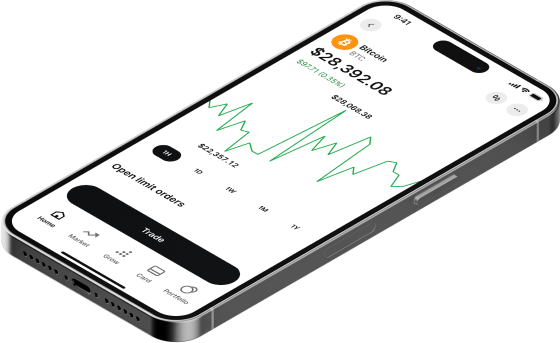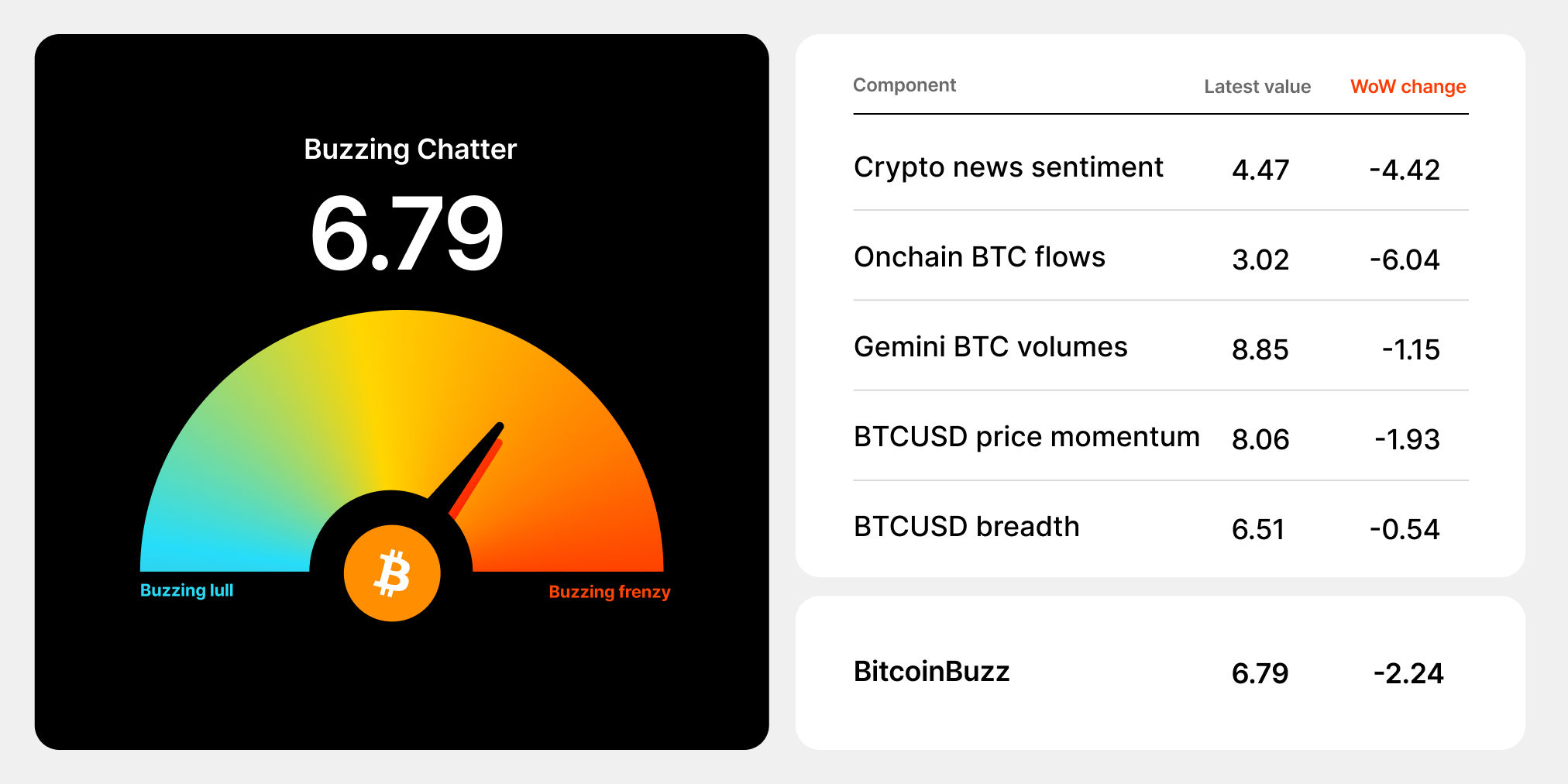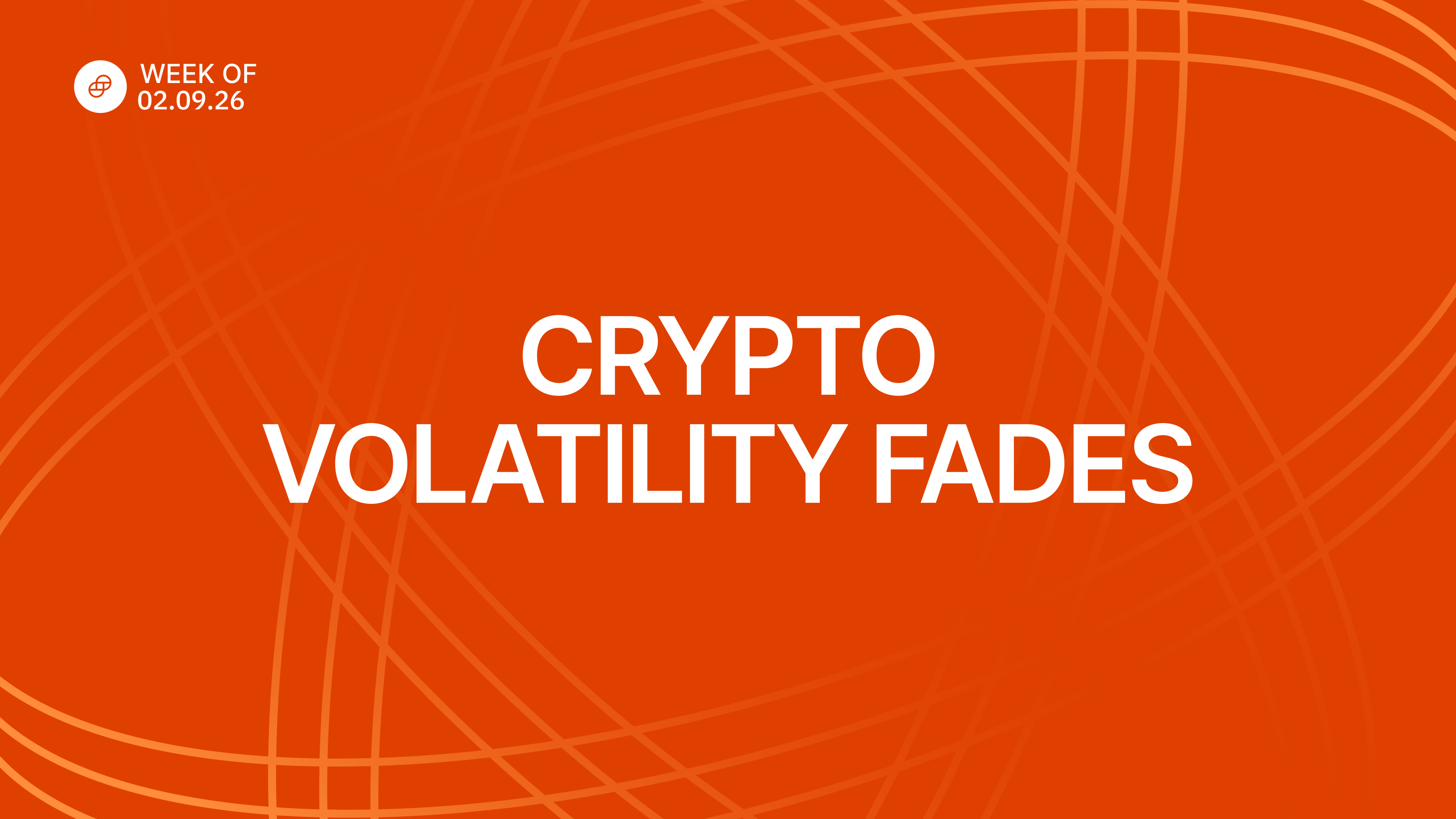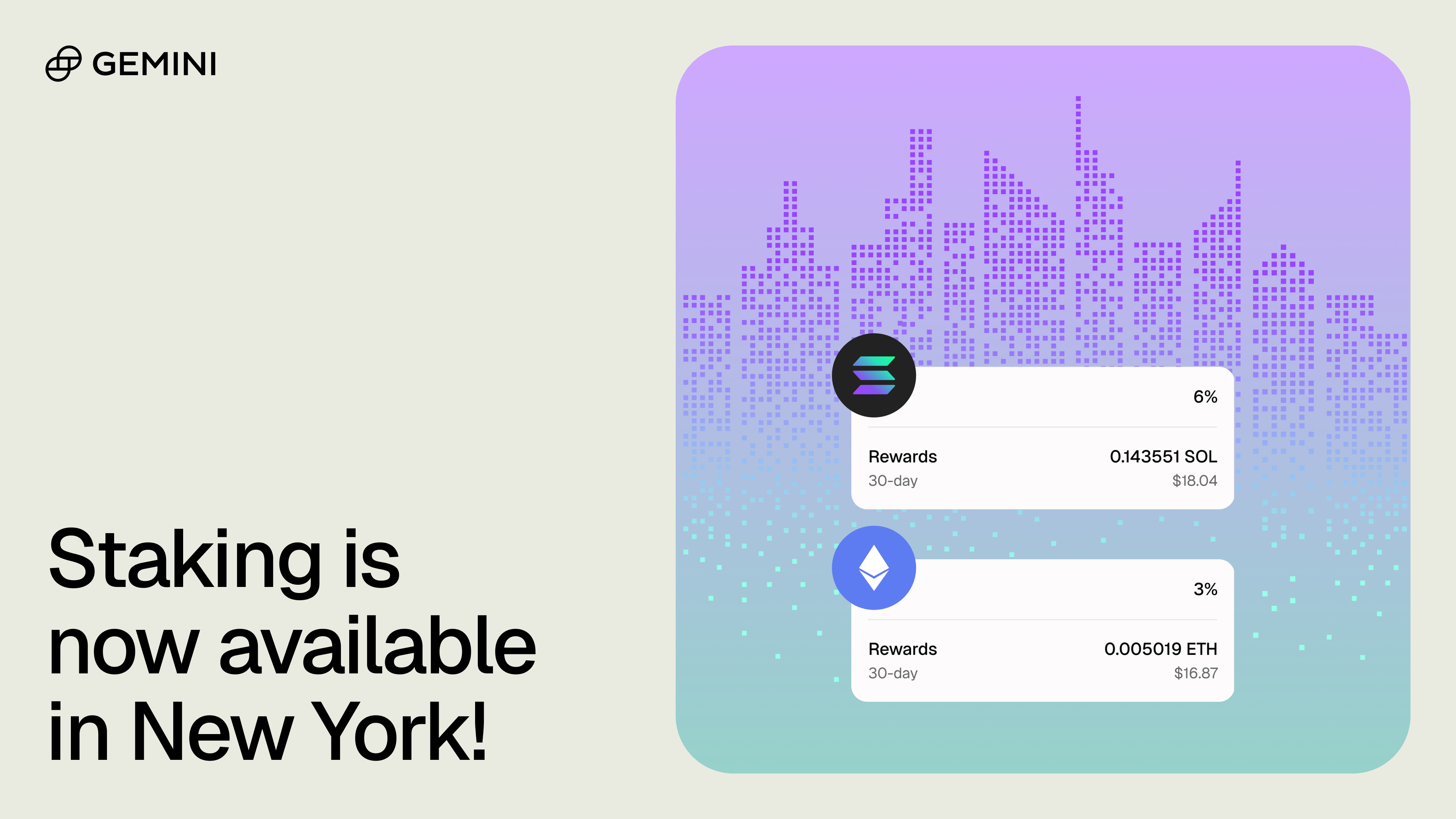NOV 22, 2023
Binance to Pay $4.3 Billion to Settle US Charges, CZ Steps Down, Kraken Sued by SEC, and Coindesk is Bought by Bullish

Welcome to our Weekly Market Update.* Explore weekly crypto price movements, read a quick digest of notable market news, and dive into a crypto topic — this week we discuss cryptoart and NFTs. We’re publishing on Wednesday this week due to the upcoming Thanksgiving holiday in the US.

| Token | Change* | Price** | ||
|---|---|---|---|---|

Bitcoin
BTC | +0.24% | $36,450 |
$36,450
+0.24%
| |

Ether
ETH | +1.30% | $2,037 |
$2,037
+1.30%
| |

SKALE
SKL | +92.70% | $0.0567 |
$0.0567
+92.70%
| |

Yearn.finance
YFI | -30.70% | $7,933 |
$7,933
-30.70%
| |

Synthetix
SNX | +15% | $3.3826 |
$3.3826
+15%
|
*Percentages reflect trends over the past seven days.
**Crypto prices as of Wednesday, November 22, 2023, at 11:45am ET. . All prices in USD.

Takeaways
- Bitcoin and crypto markets react to the Binance settlement: Bitcoin (BTC) prices and the wider crypto market saw a sudden drop on Tuesday morning after news broke that the DOJ was set to announce crypto enforcement action at a 3pm ET press conference. Following reports of the Binance settlement, BTC broke below the $37k level to as low as ~$35.8k later Tuesday evening. As of Wednesday morning, BTC is hovering in the mid $36k range.
- Binance will pay $4.3 billion and Changpeng Zhao steps down as CEO: On Tuesday, in a tectonic move for the world’s largest crypto exchange, Binance agreed to a $4.3 billion fine to resolve federal criminal charges in the US. Now-former CEO Changpeng Zhao “CZ”, also agreed to step down and pay a $50 million fine. Richard Teng is the new CEO of Binance. In a press conference, attended by top federal regulators including Treasury Secretary Janet Yellen and CFTC chairman Rostin Behnam, US Attorney General Merrick Garland outlined the charges against Binance and settlement terms. The charges included sanctions violations, running an unlicensed money transmitter business, and failing to maintain an adequate anti-money laundering (AML) program.
- Coindesk sold to crypto exchange Bullish: Coindesk, a leading crypto news site that first reported on the FTX balance sheet shortfall, was purchased by crypto exchange Bullish for an undisclosed all-cash amount. Coindesk was previously owned by crypto company Digital Currency Group (DCG).
- SEC sues Kraken for running unregistered securities exchange: On Monday, the Securities and Exchange Committee (SEC) sued crypto exchange Kraken, alleging that it operated as an unregistered securities exchange and created a “significant risk” by commingling customer crypto deposits with its own corporate assets.
- Tether freezes $225 million in coordination with DOJ: Also on Monday, it was announced that Tether, the issuer of the largest stablecoin, USDT, had frozen $225 million of USDT following a DOJ investigation into an international human trafficking ring based out of Southeast Asia.
Sign up for a Gemini account
The secure way to buy, sell, store and convert crypto. Millions use Gemini to diversify their portfolios.

Bitcoin Price Slips Amid Continued Regulatory Action Against Crypto Exchanges
prices and the wider crypto market saw a sudden drop on Tuesday morning after news broke that the DOJ was set to announce crypto enforcement action at a 3pm ET press conference. Following the reports, BTC broke below the $37k level to as low as ~$35.8k later Tuesday evening.
In the build up to the press conference, that the DOJ was set to announce a $4 billion settlement with Binance and CEO Changpeng Zhao “CZ”. The market initially responded positively as moved back above $37k, with the potential resolution to long-standing concerns over Binance’s legal issues in the US.
The press conference , with US Attorney General Merrick Garland outlining the charges and settlement terms. AG Garland was joined by Treasury Secretary Janet Yellen, Deputy US Attorney General Lisa Monaco, and CFTC Chairman Rostin Behnam, among others, who spoke at the press conference.
Industry leaders in crypto and finance saw a positive angle to the news, with that the settlement eliminated “potential systemic risk emanating from a hypothetical Binance collapse.” Ripple’s Chief Legal Officer, Stuart Alderoty, : “The Binance resolution of anti-money laundering (etc.) violations is a necessary step to bring the crypto industry into compliance with these important laws and safeguards. Big banks all went through some version of this years ago.”
has since seen a mixed reaction with the price hovering between the $36k and $37k level.
Binance to Pay $4.3 Billion Fine and CEO Changpeng Zhao “CZ” Steps Down
On Tuesday, to resolve criminal by the US Department of Justice (DOJ), the Commodity Futures Trading Commission (CFTC), the Office of Foreign Assets Control (OFAC), and Financial Crimes Enforcement Network (FinCEN). The charges included sanctions violations, running an unlicensed money transmitter business, and failing to maintain an adequate anti-money laundering (AML) program. Notably, the Securities and Exchange Commission (SEC) was not part of the joint settlement. The SEC charged CZ and Binance on a variety of securities law violations in June.
At Tuesday's press conference, top US regulators and enforcement agency heads outlined the Binance probe and the allegations leveled against the crypto exchange. Speaking on the Binance charges, : “Binance prioritized its profits over the safety of the American people.”
In addition to the corporate fine, now-former Binance CEO Changpeng Zhao “CZ” to Bank Secrecy Act violations, agreeing to step down as CEO and pay a $50 million fine. Richard Teng, the former Head of Regional Markets at Binance, . Under the settlement terms, Binance also agreed to an outside compliance monitor for three years. The monitor will have access to Binance compliance programs and report back to the US government.
, Binance noted that “with the compliance and governance enhancements enshrined in our commitments, we can begin to share our vision for Binance’s exciting future and the future of the crypto industry.” The company added: “we strongly believe that the crypto industry and Binance have a bright future.”
, Binance’s exchange token, had rallied to ~$270 on the news of the DOJ settlement on Tuesday. It is now trading down 8% on the week after news of CZ stepping down as Binance CEO.
Leading Crypto News Site Coindesk Bought by Crypto Exchange Bullish
Coindesk, the crypto news site that first reported on the FTX balance sheet shortfall, for an undisclosed all-cash amount. Coindesk was previously owned by crypto company Digital Currency Group (DCG).
Kraken sued by SEC in latest clampdown on crypto exchanges
On Monday, the Securities and Exchange Committee (SEC) , alleging that it operated as an unregistered securities exchange. The SEC also alleges that Kraken created a “significant risk” by commingling customer crypto deposits with its own corporate assets. This adds to the SEC’s continued crackdown on crypto that has seen lawsuits against and alleging similar violations earlier this year.
As part of the action, the SEC listed a number of tokens that it considers securities that were traded on Kraken, including some of the largest tokens by market cap such as , , and among others, many of which saw declines following the announcement.
Tether Freezes $225 Million Following DoJ Investigation
On Monday, it was announced that Tether, the issuer of the largest stablecoin, USDT, following a DoJ investigation into an international human trafficking ring based out of Southeast Asia.
The tokens frozen by Tether were housed in self-custodied wallets. Related to the news, said: "our recent collaboration with the Department of Justice underscores our dedication to fostering a secure environment," adding that Tether’s goal is to "set a new standard for safety within the crypto space."
-From the Gemini Trading Desk


data as of 3:20pm ET on November 21, 2023.
To learn more about the BitcoinBuzz Indicator and its components, . Check back every Friday for an updated score!

Cryptoart, NFTs, and the Art Industry
Following about The Monument Game that published earlier this week, we’re resurfacing our overview of cryptoart, NFTs, and the art industry. .
Below, we dig into a general discussion of how the relationship between crypto, NFTs, and digital art have developed over the past years.
Cryptoart is digital art that lives on the blockchain in the form of non-fungible tokens (NFTs). This fast-emerging sector is disrupting the art industry for artists, dealers, and investors alike — and creating a far more accessible, equitable, and inclusive art market. Today, we explore the origins of cryptoart and NFT art, as well as how artists may benefit from the proliferation of this new art medium.
From digital art to cryptoart
Emerging around the 1970s, digital art has become one of the more popular subgenres of contemporary art. Digital art may refer to artworks created or enhanced with software, digitally rendered animations, or interactive art consumed through a digital device. There is also “generative” digital art, which artists produce mostly by using algorithms.
Some digital artists use blockchain technology itself as their medium — employing custom software and code, along with a slew of new to create their work. Once it’s on the blockchain, digital art falls into the realm of cryptoart. So what is cryptoart exactly? As with all things crypto, the vocabulary and definitions surrounding this art movement are dynamic and iterative, but there is a baseline distinction: Cryptoart is art on the blockchain — natively published as an NFT.
These rare digital artworks — interchangeably termed crypto-collectibles, NFT art, nifties, or cryptoart — are represented by .
The rise of cryptoart and NFTs
Before NFT art captured the zeitgeist, early projects like Monegraph in 2014 and Rare Pepe in 2016 allowed users to register collectibles on blockchain networks. In 2017, a new vehicle for digital art emerged with Ethereum’s introduction of the standard, enabling the creation of NFTs and springboarding the cryptoart movement into existence. 2017 saw the rise of , , CurioCards, and Dada.nyc — paving the way for the NFT art movement.
Blockchain enters the mainstream art market
The development of cryptoart has not been limited to the fringes of the internet. In 2018, Christie’s New York became the first auction house to register a sale on a blockchain platform with its $318 million USD sale of the Barney A. Ebsworth collection. This collection featured artwork by landmark American artists Edward Hopper and Georgia O’Keeffe, among others.
.
Mainstream acknowledgment of the reached a tipping point in 2021 with the sale of digital artist Beeple’s “Everydays — The First 5000 Days.” An entirely digital crypto art piece, it sold for $69 million USD at Christie's. The sale made Beeple one of the wealthiest artists alive in the world today.
Now, there are multitudes of NFT art marketplaces such as , OpenSea, , and KnownOrigin, each with unique value propositions. Fine-art specific NFT marketplaces include Maecenas, Masterworks, Artchain.world, Aditus, and Portion.
How artists can benefit from NFT marketplaces
The plethora of online NFT marketplaces is good news for artists and collectors, as these markets are typically more accessible, approachable, equitable, and inclusive than storefront galleries.
The most important benefit for artists may be that they can get paid equitably for their work. In the traditional art model, an artist typically gets 50% of an artwork’s sale price and the gallery takes the other 50%. If the piece is resold, the artist receives no royalties. In the cryptoart world, however, an artist can earn 80% or more of the initial sale price, depending on the venue, and a standard of 10% or more of all secondary sales.
Further, these funds don’t need to be tracked down or negotiated. They are cryptographically secured and guaranteed by autonomous on the blockchain. NFTs automatically authenticate the art and track its and value as it changes hands.
Happy Thanksgiving to those celebrating! See you next week. Onward and Upward!
Team Gemini
*This material is for informational purposes only and is not (i) an offer, or solicitation of an offer, to invest in, or to buy or sell, any interests or shares, or to participate in any investment or trading strategy, (ii) intended to provide accounting, legal, or tax advice, or investment recommendations, or (iii) an official statement of Gemini. Gemini, its affiliates and its employees do not make any representation or warranty, expressed or implied, as to accuracy or completeness of the information or any other information transmitted or made available. Buying, selling, and trading cryptocurrency involves risks, including the risk of losing all of the invested amount. Recipients should consult their advisors before making any investment decision. Any use, review, retransmission, distribution, or reproduction of these materials, in whole or in part, is strictly prohibited in any form without the express written approval of Gemini.
RELATED ARTICLES

WEEKLY MARKET UPDATE
FEB 12, 2026
US Jobs Report Beats Expectations, BlackRock Launches Tokenized Treasury Fund On Uniswap, and Crypto Lobby Meets To Solve CLARITY Act Impasse

COMPANY
FEB 10, 2026
Gemini Staking Is Now Available for New York Customers

COMPANY
FEB 05, 2026